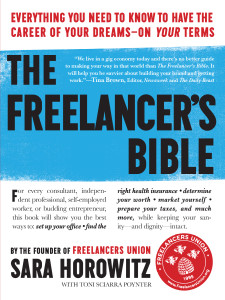I generally prefer to only post reviews of books and other resources that I’m completely enthusiastic about. I don’t want to waste your time or mine on something that isn’t worth the effort; at the very least, I don’t want to have to read a crappy book all the way through, just for the sake of writing a review. But this post will cover a book I’m not one hundred percent sold on, because there are some important questions this book has forced me to ask. For the record, I did receive a free review copy of The Freelancer’s Bible, though I’m pretty sure this isn’t the review they were hoping for.
The Good, The Bad and the So-So
Clearly, I’m wishy-washy on The Freelancer’s Bible: on the one hand, it’s an exhaustive reference manual for freelancers, particularly those just starting out. If you’re in that category, you need a book that tells you what you don’t know you don’t know. The Freelancer’s Bible covers everything it can about freelancing, even to the point of growing a freelance business into an agency or a product company — information that’s probably a bit beyond the target audience.
But the authors, Sara Horowitz and Toni Sciarra Poynter, put freelancing into a very particular context. Horowitz is the founder of the Freelancers’ Union. The name and projects of that organization appear very frequently within The Freelancer’s Bible, to the point that I started getting very frustrated as I read. The book implies that every freelancer should be a member of the Freelancers’ Union, which I see as a gross oversimplification. While I joined the Freelancers’ Union several years ago and have used their tools (though not their insurance or classes), my experience is that the organization is focused very heavily on New York City. Anything done outside of that city is something of an afterthought. There are other organizations in other places that may prove much more valuable to new freelancers.
The book comes off as a big ad for the Freelancers’ Union in spots, which detracts from its overall usefulness. I can understand why Horowitz would want to offer up the Freelancers’ Union as a resource — it is a good one, and Horowitz is rightfully proud of all the work she’s done. But it’s a bit too much.
Your Bias is Showing
We all have opinions that color our approaches to new projects — writers, doubly so. But a good writer is aware of her bias and makes sure it doesn’t get in the way of her message. The Freelancer’s Bible comes straight out of Horowitz’s experiences, however, and her own approaches may get in the way of helping new freelancers.
It’s not just a fault that appears in The Freelancer’s Bible, though. If you read a lot of books on freelancing, as I do, you’ll notice that almost all of these guides focus on writers — because writers are the ones putting them together. Horowitz’s passion is advocacy and that shines through, just as a love of writing shows up in most freelancing books.
This discussion (and I hope you’ll take the time to chime in on the comments) isn’t exactly a stunning book review, but it is an opportunity to discuss what we each bring to the table when writing a book about our passions and what we need to leave out.
